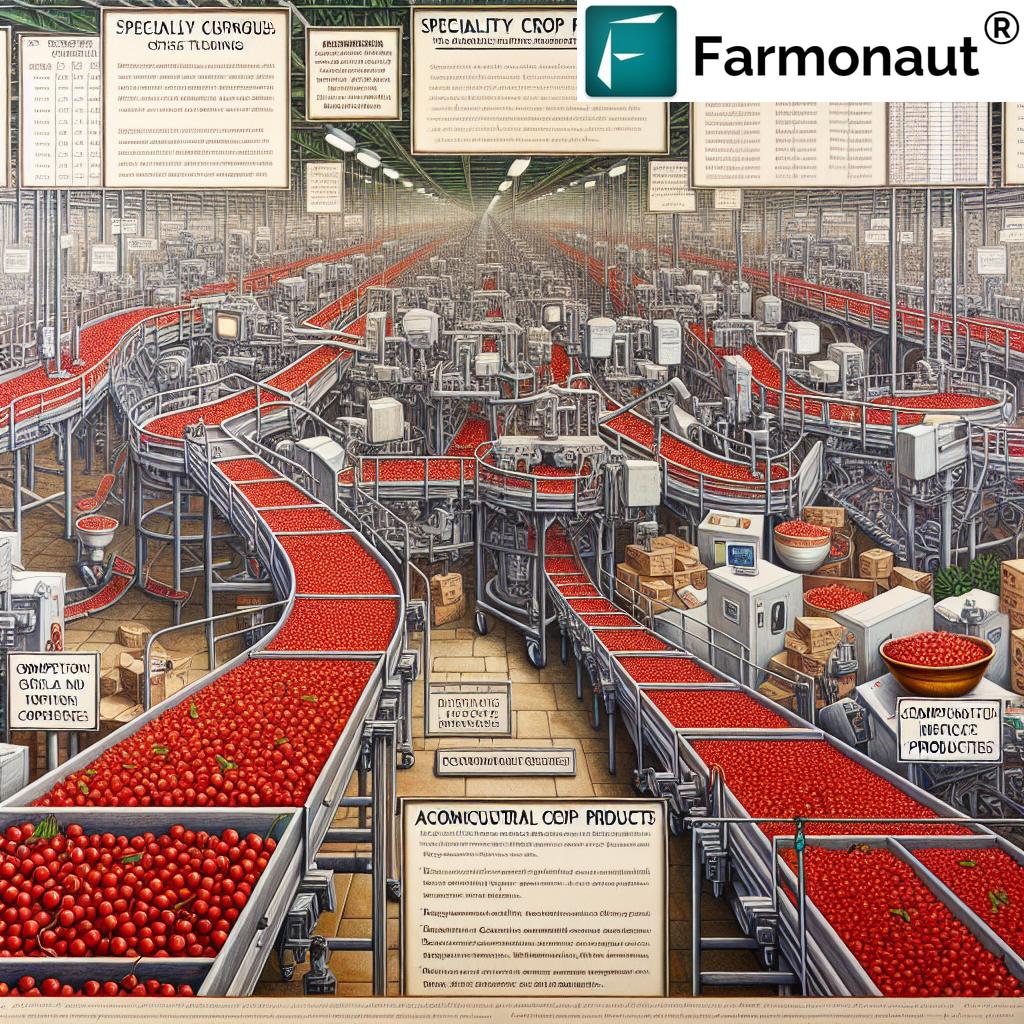Michigan Cherry Industry at Risk: 7 Key Impacts Threatening Farms
“Michigan produces over 70% of the U.S. tart cherries, but rising tariffs threaten export revenues significantly.”
The Michigan cherry industry is at a crossroads. Years of rising input costs, weather volatility, shifting global trade policies, and changing labor dynamics are threatening the sustainability of our iconic cherry farms. As leading producers of tart cherries—responsible for approximately 75% of the nation’s output—Michigan’s role in the specialty crop sector is not only vital to our economic health but to our agricultural heritage.
In this comprehensive exploration, we, as stakeholders in Michigan’s thriving yet vulnerable cherry industry, analyze the 7 key impacts threatening our cherry farms. We utilize the latest Michigan State University agriculture research, state agricultural data, and expert testimony to shed light on the challenges that cherry farmers in Michigan face—and how advanced solutions, like Farmonaut’s precision agriculture technology, can play a role in supporting future resilience.
Michigan Cherry Industry: Overview & Global Significance
Michigan’s cherry orchards define much of the agricultural landscape of the Grand Traverse Bay region, Leelanau County, and other rural corners of our state. For generations, these farms have produced world-class tart cherries—the backbone of an industry critical to both our rural economy and our national food system.
According to the U.S. Department of Agriculture, Michigan produced 180 million pounds of tart cherries valued at $36.5 million in 2022. That’s about three-quarters of the country’s total output—illustrating our dominance in the specialty crop sector. But in 2024, catastrophic weather events, trade uncertainties, and soaring costs have pushed our industry’s vulnerability to the brink.
Major Contributors to the Michigan Cherry Sector:
- 75% of national tart cherry production comes from Michigan.
- Thousands of farms across the state, many family-owned and multigenerational.
- Agricultural output supports local packing, processing, and export facilities.
- Significant contributor to Michigan agriculture exports—with international demand playing a key revenue role.
Current State of the Industry in 2024:
- Severe weather in 2024 resulted in a 75% orchard yield loss statewide—classified as a disaster.
- President Donald Trump’s tariffs and retaliatory trade policies have heightened market instability.
- Input costs—especially for fertilizer, labor, and specialized equipment from abroad—have risen sharply.
- Labor shortages and high minimum wages for H-2A migrant workers threaten farm workforce sustainability.
“Input costs for Michigan cherry farmers have surged by more than 20% in the past five years, straining profitability.”
7 Key Impacts Threatening Michigan Cherry Farms
Let us analyze the 7 pivotal risks placing the Michigan cherry industry on a tipping point:
- Rising Input Costs: Fertilizer, pesticides, fuel, and specialized agricultural equipment have surged in price due to global inflation and tariff-induced supply chain disruptions.
- Tariffs & Global Trade Policy: U.S. tariffs, particularly those imposed during President Trump’s administration, have raised costs for imported farm supplies and triggered retaliatory foreign tariffs on U.S. cherries and specialty crop exports.
- Adverse Weather Events: Frequent freezes, frosts, and erratic spring temperatures continue to devastate cherry orchards, causing severe production losses.
- Labor Shortages & Wage Pressures: The requirement to pay high Adverse Effect Wage Rates (AEWR) for H-2A migrant workers increases the cost of growing, packing, and processing cherries.
- Competition from Imports: Countries like Turkey and others export cherry juice and products to the U.S. at prices often below domestic production costs, reducing the market share of Michigan-grown cherries.
- Crop Diseases & Pest Management: Global trade, climate shifts, and intensive orchard management have increased the spread of pests and diseases.
- Volatility in Market Prices: Increased supply from international competitors and reduced exports due to tariffs often lead to lower cherry prices and declining farm revenues.
Comparison Table of Key Challenges and Estimated Impacts on Michigan Cherry Farms
| Challenge | Estimated Impact on Production (%) | Estimated Financial Loss (USD/Year) | Description |
|---|---|---|---|
| Rising Input Costs | 10–20% | $7M–$10M | Increased prices of fertilizer, specialized equipment, and pesticides directly reduce farmer margins, making production less sustainable. |
| Tariffs on Exports/Imports | 5–12% | $3M–$6M | Tariffs raise input costs and can trigger retaliatory measures from trade partners, affecting cherry market competitiveness on a global scale. |
| Adverse Weather Events | 50–75% (2024 disaster) | $20M–$27M | Spring freezes, frosts, and severe storms can devastate yields, often leading to disaster declarations and emergency federal loans. |
| Labor Shortages/Wage Increases | 8–15% | $4M–$8M | Increased H-2A guest worker wages and lower labor availability make growing and harvest more expensive, potentially leading to over 1,600 job losses if costs rise 10%. |
| Competition from Imports | 10–20% | $7M–$12M | Foreign producers, especially Turkey, export cherry juice below Michigan farm production cost, undercutting prices and shrinking the domestic market. |
| Crop Diseases & Pests | 3–7% | $1M–$2.5M | Increased disease and pest pressure from climate shifts and global trade threaten yield stability and raise management costs. |
| Market Price Volatility | 10–15% | $5M–$9M | International competition and disrupted exports often reduce domestic market prices, challenging profitability. |
In-Depth Analysis: The Effects of Each Challenge on Cherry Production
1. Rising Input Costs
The cost of fertilizer, pesticides, and farm equipment—much of which is imported—has increased by more than 20% in five years. With cherry growers in Michigan heavily reliant on these inputs, especially specialized equipment from abroad for harvest and orchard management, profitability is under direct threat.
- Higher fertilizer and pesticide costs reduce the net value of cherries produced.
- Costs are passed onto every stage: from growing to packing and processing.
- Smaller farms are often unable to absorb these increases, risking closure or significant production losses.
2. The Impact of Tariffs on Agriculture & Trade Policy Instability
The impact of tariffs on agriculture has been double-edged. While some argue a 10% import tariff supports domestic cherry farmers in Michigan by making local products more competitive, tariffs also raise costs for imported inputs. International trade partners, including the EU and Turkey, have retaliated—placing Michigan cherry exports at risk and reducing our global competitiveness.
- Tariffs are seen as “short-term pain, long-term gain” by some, but the benefits are marginal at best for tart cherry production.
- Continued policy instability makes it difficult for farms to plan investments, adapt, or grow.
- Changes in export accessibility directly influence revenue and job security in the Michigan specialty crop sector.
3. Adverse Weather Events and Cherry Orchard Vulnerability
Weather impact on cherry crops is perhaps the most acute immediate challenge. In 2024, a disastrous series of spring freezes resulted in a loss of up to 75% of total production statewide. Similar catastrophic years, such as the freeze of 2012 (the worst since 1926), underline the high vulnerability of Michigan cherry orchards to the changing climate.
- Weather unpredictability complicates farm management and insurance planning.
- Disaster declarations and federal emergency loans can only partially buffer long-term damage.
- Cherry season success is now more dependent on mitigating weather risk than ever before.
4. Labor Shortages and Cherry Farm Labor Costs
Michigan cherry packers and producers virtually rely on H-2A migrant workers. The Adverse Effect Wage Rate (AEWR) for 2024 is $18.15/hour, after an increase from $17.36/hr in 2023. State research shows that just a 10% labor cost increase in growing, packing, and processing could result in the loss of over 1,600 jobs.
- Many growers hope for federal legislation to freeze H-2A wages, yet uncertainty remains.
- Labor shortages during peak harvest can lead to higher rates of unharvested or spoiled crops.
- Rising labor costs compound with input price hikes to squeeze farm profit margins.
5. International Competition and Market Price Fluctuations
Turkish exporters flood the market with cherry juice priced below Michigan’s own production costs, undermining profitability. While tariffs may offer modest relief by leveling the market temporarily, they are insufficient to fully offset structural advantages foreign producers enjoy, such as lower labor and land costs.
- Michigan cherry exports become less competitive, which suppresses local market prices.
- Prolonged price volatility leads to long-term declines in farm investment and regional economic stability.
- Packers and processors dependent on high-volume production see facility utilization rates decline.
6. Rise in Crop Diseases and Pest Pressures
Intensification of production, climate-related stress, and international trade have raised pest and disease pressures. Cherry growers now face old and new threats, which further increase pesticide usage and push input costs higher.
- Greater reliance on effective and costly pest management regimes.
- Potential yield and quality reductions, especially during adverse seasons.
- Staff and resource time diverted to disease and pest outbreak control.
7. The Domino Effect on Rural Development & Specialty Crop Sector Michigan
The reliance on shared equipment, facilities, and workers means that a loss in tart cherry production, or any specialty crop, can have a domino effect across diversified farms. A major crop disaster impacts rural development, farm employment, local processing, and the broader specialty crop sector in Michigan.
- Sustained losses in one major crop threaten the viability of multiple other farm businesses in the same region.
- Facilitates a downward spiral of declining investment, jobs, and economic vitality across rural communities.
Innovative Solutions & Farmonaut Technologies Supporting Resilient Michigan Cherry Farms
As our industry faces these mounting pressures, precision agriculture emerges as a practical way for cherry farmers to optimize resources, minimize losses, and build resilience. Farmonaut offers accessible technology that addresses key challenges associated with rising input costs, weather risk, and sustainability.
- Satellite-Based Crop Health Monitoring: Farmonaut’s platform provides real-time vegetation indices (NDVI), soil moisture, and crop stress mapping directly from satellites, helping us manage input application, irrigation, and pest control more efficiently—potentially reducing cost and loss during adverse seasons.
- AI-Driven Jeevn Advisory: Designed to deliver personalized, data-driven recommendations, this system helps Michigan cherry growers make prompt decisions before weather or disease impacts escalate. Insights cover everything from optimal fertilizer rates to timing for treatments.
- Blockchain-Based Traceability: Enhance transparency and trust in Michigan cherry products for global exports. With secure traceability solutions from Farmonaut, every stage from orchard to market can be monitored, giving Michigan cherries a competitive edge in international markets.
- Fleet and Resource Management: Farms managing extensive rural acreage and shared equipment benefit from Fleet Management, optimizing usage, reducing downtime, and cutting costs at every stage of the harvest and distribution chain.
- Carbon Footprinting: Farmonaut’s carbon footprinting tools allow cherry sector businesses to measure and reduce emissions, supporting both compliance and sustainability storytelling in export markets.
- Crop Loan and Insurance Verification: Access to satellite-based loan and insurance verification makes financial support more attainable, especially after disaster years, and reduces fraudulent claims—easing risk for lenders and growers alike.
Developers and agribusinesses who require agricultural data can explore Farmonaut’s robust API and the API developer documentation to integrate satellite analysis and weather insights directly into their platforms, enhancing their own productivity and data-driven decision-making.
For larger-scale farm operators and administrators managing multi-crop operations, a dedicated Large-Scale Farm Management solution supports advanced analytics, workforce management, plantation monitoring, and more.
Farmonaut Subscription Options
Farmonaut operates on a transparent, subscription-based model suitable for all scales of operation. Explore subscription packages, pricing, and feature comparisons below:
Future Trends: The Road Ahead for Tart Cherry Production in Michigan
What does the future hold for this iconic industry? The 2024 season highlighted just how vulnerable our farms are to global market forces, weather disasters, and shifting policy. Leaders like Michigan State University are calling this a “tipping point” for our specialty crop sector, and rightly so.
- Diversification & Value Addition: Cherry farmers and packers believe that introducing new, affordable cherry-based products (e.g., tart cherry juice, health supplements) is essential for stabilizing market demand and enhancing farm viability.
- Policy Advocacy: The need for clear, long-term federal and state policy supporting tariff relief, disaster recovery, and fair labor standards is more pressing than ever.
- Investment in Technology: Only through continuous adoption of advanced, accessible technology, like satellite-based monitoring and AI-driven advisories, can the Michigan cherry industry become resilient enough to withstand further shocks and thrive in the coming years.
Our commitment to integrating innovative solutions—combining tradition with technology—will determine if Michigan remains the capital of American cherries for future generations.
In summary:
- Input costs and global trade volatility present long-term structural risks.
- Climate unpredictability demands constant adaptation and advanced risk management.
- Affordable and scalable technology, like Farmonaut, will be crucial in supporting crop health, yield optimization, and sustainability for all stakeholders in Michigan’s specialty crop sector.
Frequently Asked Questions (FAQ)
1. Why is the Michigan cherry industry so important nationally?
Michigan produces approximately 75% of the U.S. tart cherry crop. This leadership position makes it critical for national food processors and retail markets, and export revenues rely on a vibrant, competitive Michigan cherry farming sector.
2. What is the main cause of current financial stress for Michigan cherry farmers?
The most significant factors are rising input costs (fertilizer, labor, and equipment), adverse weather impacting yields, and tariff-driven volatility in both supply and global demand for Michigan cherries.
3. How have tariffs specifically impacted Michigan cherry production?
Tariffs have raised the price of essential farm inputs (many imported) and led to retaliatory tariffs by other countries, making U.S. cherry exports less competitive. The resulting uncertainty has discouraged investment and risked long-term market share.
4. What technologies can help Michigan cherry farmers navigate these challenges?
Precision agriculture solutions like those provided by Farmonaut (including satellite crop monitoring, AI-based crop advisories, and traceability features) allow farmers to optimize resource use, monitor field conditions in real time, and protect against supply chain or environmental disruptions.
5. Where can I learn more about Farmonaut’s service options and pricing?
You can find details on Farmonaut’s platform and subscription packages, or explore their Carbon Footprinting, Traceability, Crop Loan and Insurance, and Large-Scale Farm Management solutions for farmers, agribusinesses, and industry professionals.
6. How can I access Farmonaut on my device?
Farmonaut is available as a web/browser platform as well as dedicated Android and iOS apps.
Conclusion
The Michigan cherry industry, our pride and a cornerstone of the state’s agriculture, stands at a highly vulnerable position, threatened by rising input costs, tariffs, labor shortages, market competition, and relentless weather impacts. State and federal policy, robust export markets, and sustainable farm management technologies must converge to preserve and revitalize our cherry sector.
We, as a collective of growers, agribusiness professionals, and agricultural technology providers, share a common purpose: to support cherry farmers in Michigan and ensure the future of tart cherry production through innovation, advocacy, and sustainable practices.
Leverage Farmonaut’s accessible, data-driven tools today—empowering your farm to compete, thrive, and weather the next storm.






















